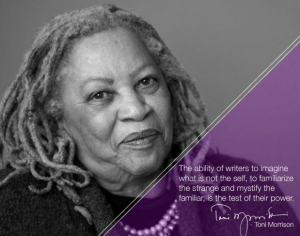I love this quotation from Toni Morrison: “The ability of writers to imagine what is not the self, to familiarize the strange and mystify the familiar, is the test of their power.”
Unpacking what she’s saying would take a long time, and even then I don’t think I’d get all of it. But that’s not the point, is it? I mean she’s already said what she wanted to communicate. Why is a restatement necessary?
What really excites me about her statement is that it breaks away from so much of what we think is true about writing: Write what you know. Write from your gut. Be true to yourself.
Nope. According to Morrison, writing isn’t about you (or me) at all. It’s about power – using words to transform reality into something new and unexpected. “Familiarize the strange” – make me feel connected to something outside the realm of my experience. “Mystify the familiar” – show me that what I’m seeing (or what I think I’m seeing) is only part of the picture.
My favorite nonfiction book, The Little Princesses, falls into the “familiarize the strange” category. I’m never – alas – going to be on intimate terms with royalty. But I can slip into their world and look around – thanks to this reminiscence by the governess who taught Princess Elizabeth (now Queen Elizabeth II) as a child.
“Mystify the familiar” is the category for the piles and piles of books I’ve read about language and psychology. Nothing is more ordinary than the everyday words we use and the habits that shape our daily lives. But when someone with a brain like James Hillman’s or Jacques Derrida’s gets to work, nothing ever looks the same again.
What an exciting way to think about writing!


